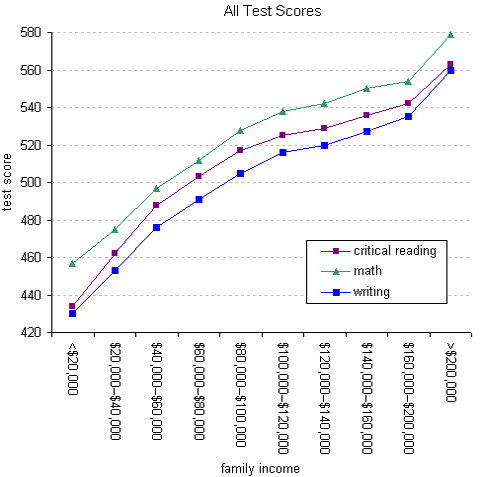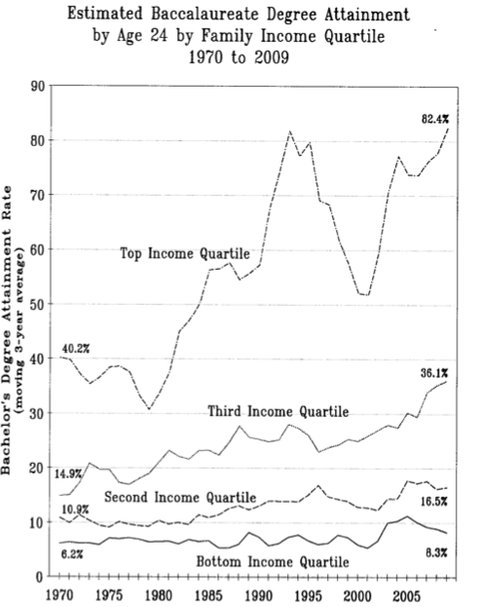 So this is what learning looks like in America. If you’re middle class or wealthier, your children do pretty well. More than 80% of them will graduate w/ a 4-year degree(see below). If, however, you’re in the bottom quartile (the bottom 25% of American wage-earners), your children have about 1/10 that chance. 8.3% compared to 82.4%. In other words, if you have resources, so do your children. And their children, as it turns out. But if you’re poor? Forget it. THAT is the American reality, folks. And it’s the real naked emperor in the classroom…
So this is what learning looks like in America. If you’re middle class or wealthier, your children do pretty well. More than 80% of them will graduate w/ a 4-year degree(see below). If, however, you’re in the bottom quartile (the bottom 25% of American wage-earners), your children have about 1/10 that chance. 8.3% compared to 82.4%. In other words, if you have resources, so do your children. And their children, as it turns out. But if you’re poor? Forget it. THAT is the American reality, folks. And it’s the real naked emperor in the classroom…
I teach, and I work with teachers. But that means I also work with students. For years, I taught ‘developmental English’ at a private, select admissions university. Developmental English for native speakers means you teach first-generation academics: the first college-bound young men and women of their families. They had very low ACT scores — one had an ACT of 8. Rumour is that you can get a 12 just by filling in all the circles under ‘c.’
My students would share stories of their lives — stories about single mothers who worked two jobs, sometimes three. About being left ‘in charge’ of younger siblings at 9, or 10 years old. When I was 12, we lived w/ my grandmother & great-aunt for a year, while my father worked overseas. At 1 in the morning, my mother would wake me up to watch my three younger sisters as she drove downtown to pick my grandmother & great-aunt up from their night of cle aning bank offices.
aning bank offices.
Demons would crowd the windows — just beyond the drawn shades, I was sure. I could no more have handled an emergency w/ my sleeping sister than I could have raised the blind to confront those imaginary demons. Aside from the terror of sitting alone in the house for the hour it took my mother to drive downtown, pick up the old ladies, and return, I rarely had an unbroken night’s sleep. It wasn’t my highest performing year of school, needless to say.
My students told stories like these, and others. Stories of bad neighbourhoods where gunshots were the night’s dark refrain. Where drive-bys weren’t rare, but books and help with homework was. Not for lack of interest — please don’t misunderstand. But because both parents were working. Late. Just to make ends meet…
When my younger son was in kindergarten, his teacher (a Mrs. Brown) spoke of the differences in teaching a child who had a stable home life. Who was well-fed each day. Who had help on his homework. Whose parents were able to enroll him in museum programs in the summer. Things I never take for granted, but I’m afraid many Americans may.
Not everyone wants to — or should — go to college. My younger son makes far more money than I do, and has no 4-year degree. My niece’s fiancé has a critical security job, and no 4-year degree. Neither of my parents had 4-year degrees. As Mike Rose says, “we tend to think too narrowly about intelligence, and that narrow thinking has affected the way we judge each other, organize work, and define ability and achievement in school.” There is critical thinking, meta-cognition, and intellectual work involved in many environments other than college & university.
 But we pay lip service only to this idea, for the most part. When politicians say that there is plenty of access to American education, students only have to ‘earn their way,’ what do these voices know about my students? A young man in my class, Student A, has joint custody of his two children, whom he helps support. He also has a full-time job. He’s also going to school. Is he as capable as another young man, Student B, in the class, who has a family helping support his school career? Certainly. But Student A has to miss class for work, sometimes. And he’s up late w/ kids, sometimes. Those situations — coupled w/ fatigue and just plain overwhelmed — mean that sometimes Student A’s assignments are late. Which means he doesn’t receive the grades of family-supported Student B.
But we pay lip service only to this idea, for the most part. When politicians say that there is plenty of access to American education, students only have to ‘earn their way,’ what do these voices know about my students? A young man in my class, Student A, has joint custody of his two children, whom he helps support. He also has a full-time job. He’s also going to school. Is he as capable as another young man, Student B, in the class, who has a family helping support his school career? Certainly. But Student A has to miss class for work, sometimes. And he’s up late w/ kids, sometimes. Those situations — coupled w/ fatigue and just plain overwhelmed — mean that sometimes Student A’s assignments are late. Which means he doesn’t receive the grades of family-supported Student B.
Beginner’s Heart. It doesn’t mean just breathing. It doesn’t mean just buying a mala and telling beads. It also means — at least for me — engaged Buddhism. Which means taking the principles of compassion, kindness, and awareness into our communities. When we see injustice, as engaged Buddhists we’re called to insert ourselves. To work towards change.
That’s what this is about. There are many different movements to reform education. But the best indicator of a child’s long-term success is still zipcode. To pretend otherwise, and to refuse to address the basic inequities in American society, is to collude w/ the rest of the emperor’s entourage. To pretend that the American Dream is alive and well for all American children. When really? Your chance of achieving that dream is 8.3 % if you’re poor. The emperor needs new clothes, America.

